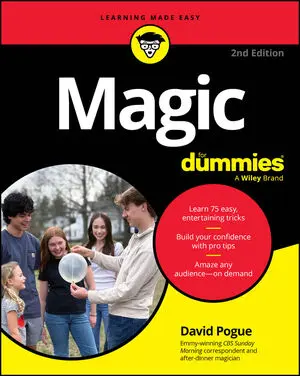-
The Yellow-Bellied Grabber: This spectator can’t resist grabbing your props. Before you perform, you’ll find him circling you like a vulture, trying to peek into your stuff; after each trick, he’s the first to snatch your props away in hopes of finding out how you did it. Turn him into your ally by choosing him to help with a trick that makes him look good.
-
The Ruby-Throated Guesser: Immediately after you’ve created some moment of impeccable, poetic magic, this species shouts out her theory as to how you did it. ("You switched it when we weren’t looking!") That can rattle you if you’re not used to it; have a clever line (or another trick) ready to go, just in case.
-
The Farfetched Guesser: This sub-class of spectator also likes to shout out guesses — but this variety comes up with incredibly ridiculous theories. They’ll accuse you of writing down a prediction in your pocket during the tenth of a second when you were reaching for a pen, or of having magnets installed in your hands, or of having made a secret agreement with everyone else in the audience before the show started. Although most people recognize the absurdity of these guesses, the outbursts can still detract from the delicious final moment of a trick.
-
The Long-Billed Believer: In this age of Psychic Hotlines, X-Files, and alien-abduction theories, an increasing number of audiences actually believe in magic. Do a mindreading trick for this kind, and you get almost no reaction at all — just a small, knowing smile and some nodding. It can be hard to impress one of these onlookers, since they’ve quietly believed all along that reality is a government conspiracy.
-
The Clueless Dodo Bird: Somebody who forgets his card, making your trick worthless — or, worse, doesn’t follow instructions.
-
The Puff-Chested Boyfriend: In the presence of a girlfriend, a funny thing happens to this ordinarily easygoing species: He becomes surprisingly defensive, remarkably unreceptive to being entertained by the magic. He doesn’t like her to see that he can be fooled.
-
The Fuzzy-Tummied Hatchling: Performing for children — or the childlike — can be one of the most rewarding experiences for a magician. A child doesn’t yet have the ego of a Guesser or a Puff-Chested Boyfriend, and therefore isn’t threatened by your magic. As a result, you can relax, focusing on what you’re saying, on creating a feeling of mystery, on your delivery — and then bask in a young child’s reaction of pure wonder and delight.
Most audience members enjoy the entertainment and mystery of a magic show. But magic is an assault on every law of nature we’ve learned — making some people’s brains squirm. As you’re working through your magical career, here are some of the rarer magic spectators to watch out for:





